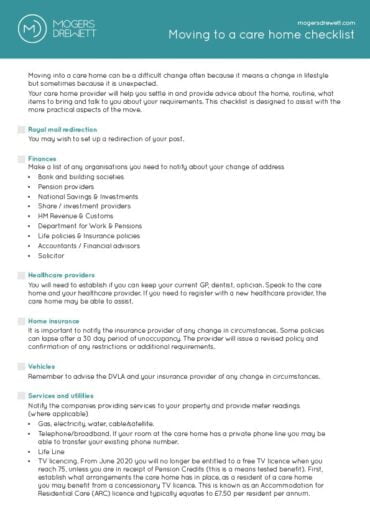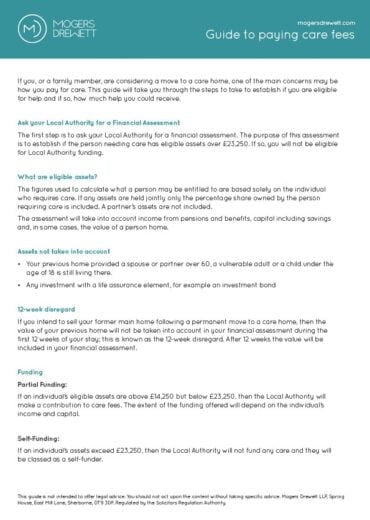Moving into care
If you are a relative facing the prospect of a loved one moving into a care home, talk to our Later Life Support team. They can provide the support you need to make this challenging process as smooth as possible.
Moving into a care home can be a tricky transition, partly because of the change in lifestyle, but also because it can be unexpected.
Funding care
One of the main concerns people have is how care will be funded. Our Later Life Support team can take you through your options, establish whether you are eligible for financial help, and if so, how much help you could receive.
Finding the right care
Finding the right care home for you or your loved one is crucial. We can provide details of quality care providers across the region, ranging from flats with communal facilities and support, to residential and nursing homes with round-the-clock care. We can also organise visits or attend homes on your behalf. We understand that everyone is different: some people want/need a smaller home with a family feel, while others are happier in larger homes. We work entirely with our client’s needs and wishes in mind to ensure we find the right care.
Financial management
As we get older, paying bills and managing our day-to-day finances can be a challenge. Our specialist team can provide practical support and guidance to help you organise your finances and plan for the future.
Companionship
Everyone, regardless of age, appreciates the positive impact that regular communication with friends, family and trusted connections brings. Studies show that older adults who regularly communicate with others in their family or in their community are generally healthier and happier. We also understand that sometimes distance prevents family and friends from visiting as often as they would like.
When you can’t be there in person, a companion can help provide your loved one with the social support they need to live a full and complete life. Whether your loved one needs a full-time carer or simply a supportive friend to stop in for a few hours a week, an experienced companion can help your loved ones stay socially active.
We can put you in touch with trained and trusted companions and agencies who we have worked with for a number of years.
Next steps: get in touch
If you need legal advice regarding the move from home into care, contact our friendly team on: 0800 533 5349 or enquiries@mogersdrewett.com
Meet the team
Frequently asked questions
You cannot force someone who is deemed to be of sound mind and able to care for themselves to move into a care home if they don’t want to. That being said, there may be situations or illnesses that arise which mean a person is safer and better supported living in a care home.
When looking at funding care the first step is to ask your Local Authority for a financial assessment. The purpose of this assessment is to establish if the person needing care has eligible assets over £23,250. If you do, you will be classed as a self-funder and expected to fund your own care using your own income, savings and in some cases, the value of your home. If any assets are held jointly, only the percentage share owned by the person requiring care is included. A partner’s assets are not included.
Advance planning is essential to protect your home so that your family can inherit it. Setting up an asset protection trust is the best way to protect your estate from being used for care home fees and to preserve your loved ones’ inheritance. Our team can help you do this.
Costs vary considerably depending on the type of care you need or choose, and depending on where you live. It is important to research the care options within your area as this will help you better prepare to fund future care if needed.
If you move permanently into residential care and your eligible assets exceed £23,250, it’s likely you would be expected to sell your property in order to pay for care costs. However, if your former home is occupied by a spouse or partner over 60, a vulnerable adult or a child under the age of 18 this would not be the case.
We can provide details of local care providers and even arrange visits or attend homes on your behalf, if required.






